Pledge on the Golden Jubilee of Independence
Khushi Kabir, Chairperson, ALRD and Coordinator, Nijera Kori
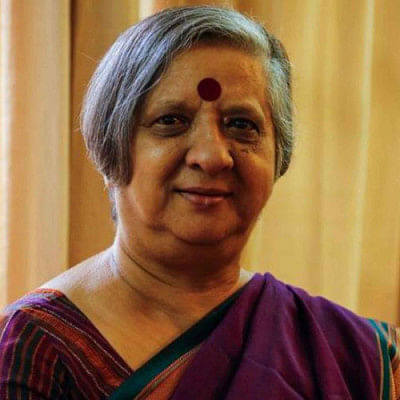
The topic of today's discussion is critical. The majority of our population is still dependent on agriculture for their livelihoods. In our journey towards self-sufficiency in food production and food sovereignty, agriculture will play a central role. Women's contribution to these sectors has to be recognised. Women have always had a role in agriculture, but they have never been given proper recognition. The male farmers I have spoken to before would always suggest that the women were not making any economic contribution. But this was a completely false presumption because the process of converting the paddy to rice to be sold in the markets was done entirely by the women. Women also play a significant role in rearing farm animals such as ducks, chickens, cows, and goats. They even cultivate vegetables and gather firewood. At present, the women farmers are also directly working in the fields, just like their male counterparts. Considering all of this, women's contribution to agriculture seems to be immense.
On this Golden Jubilee of independence, I'd like to remind everyone of some of the revolutionary steps taken by Bangabandhu Sheikh Mujibur Rahman in 1972. Several laws were enacted at the time, including the Alluvion-Diluvion Land Laws of 1972 that mentioned the need to distribute khas land to the landless people. As per the 1987 policies drawn up from this law, both the husband and the wife register along with their photos for identification to receive the khas land. But, the law has often been overlooked and instead, traditionally, after a divorce, the man tends to take hold of the land, and the woman is left deprived of her right to the land although it is registered under her name as well. For women-led households, only the women with an able-bodied son can own land. We must work to help bring change to these traditions and laws. Most importantly, the government must ensure that women receive their fair share of khas land during its distribution.
The parliament should truly work democratically and play its role properly. We can form strong unions to hold onto khas land and prevent it from being grabbed. If khas land falls in the wrong person's hands, the Right to Information Act can be used to reclaim it. Land grabbers must be resisted to allow cultivation on khas land.
Most of our laws are relics of the British period. We must completely discard these laws. Furthermore, there exist many complexities, and corruption is pervasive throughout the whole system. The Cooperative Act must be amended to make it appropriate for current times. But even before that, women's right to khas land has to be established. It must be ensured that women can use the khas land that is rightfully in her name.
In terms of the inheritance laws, whereas Ayub Khan successfully modernised the Muslim laws, we are still living in the past. We can create a parliamentary caucus on land ownership. Through this, we must establish women's equal land and agriculture rights.
Then, we will not only achieve the Sustainable Development Goals (SDGs) but also be able to uphold the principles with which we made the country independent.
Rowshan Jahan Moni,
Deputy Executive Director, ALRD
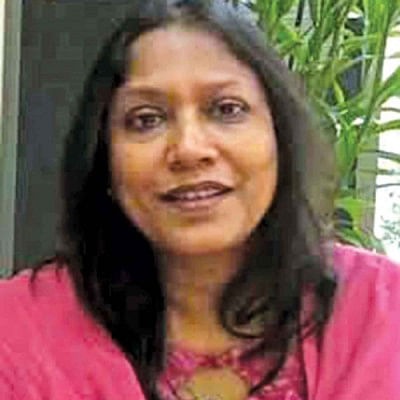
Over the years, women's participation has increased in almost every sector. But where we are lagging behind is their lack of authoritative power in decision-making in terms of their recognition as farmer, access to finance, and land ownership.
According to SDG five, for economic progress, poverty eradication, and social development, women's socio-economic, and political empowerment is extremely crucial. In order to fulfil this, women's economic independence is the gateway to empowerment. At the same time, the political empowerment of women is equally important to uplift women's position. Our government has greatly succeeded in fulfilling SDGs and the government also implements SDG trackers. However, due to the existence of various discriminatory policies against women, progressing in gender equality still seems like a distant dream. A long-standing demand of "uniform family code" is to be adopted and enforced in reducing the gap.
For the rural women, who are deeply engaged in agriculture, at present, they constitute 72.6 percent of the total agricultural labour force of the country. But, they only have five to six percent of effective land ownership and due to that they are not recognised as farmer but instead as agricultural labourer. This poses as a huge hurdle for them in accessing necessary agricultural support services. Land ownership does not serve only as a means of economic empowerment; it also acts as social capital, a stepping stone towards achieving socio-political empowerment. Research showed that greater accessibility to land leads to increased financial and food security.
Regarding landless women who are single, widowed, or abandoned, their access to public (khas) land, is further constrained if they do not have an "able son". It is high time for the Government to remove this pre-condition from the Khas land management and distribution policy.
In terms of agriculture, women's involvement used to be mainly restricted to the post-harvesting procedure. But currently women are working at every level. In the past eight years, women's involvement in agriculture has seen an increase of eight percent. According to the government ststistics,72.6 percent of labour force in agriculture consists of women. Even with such increased participation, these women face challenges due to lack of control or ownership over the lands that they work on. These women also do not receive recognition as farmers but are instead called agricultural workers.
We must also strongly focus on the growing concern of everyday harassment and violence against women and must put coordinated efforts to ensure justice timely. The work towards inclusive development requires a comprehensive plan and we all need to work in enabling an inclusive environment in order to achieve women's equal rights in every sector.
Abu Sayeed Khan,
Prominent Journalist, Samakal

The awakening of women took place during the liberation war. During the British and Pakistan eras, women were kept confined but during the liberation war of Bangladesh, women were able to come out of that confinement. It was after the liberation war that women's involvement in the workplace started to take off and they also started getting more involved with agricultural work in the field which was not a common scenario back then. This involvement in agriculture has now increased to about 72 percent. Unfortunately, even though their involvement has increased to such a great extent, land ownership of women still remains at about four percent. This inequality in land ownership has a lot of contributing factors, with one of them being the Muslim Family Law which dictates that the daughters of a family shall receive half of that of the sons. Even here, women are restricted from inheriting property.
The women in our country have made tremendous progress but in terms of political decision-making they are still lagging behind. Without the involvement of more women in politics, it will not be possible to bring changes to the existing discriminatory laws.
Dr. Ainoon Naher,
Professor, Department of Anthropology, Jahangirnagar University

Historically, women have always been deeply involved in agriculture. At present, statistics show that 70 to 80 percent of the food production in the world is carried out by women. The various statistics at the government and private levels show that women's participation in agriculture is gradually increasing. We need to analyse this participation through various angles in order to fully understand it. Participation does not always have a positive effect and there might be much deeper socio-economic effects.
We can see that the whole agricultural sector is gradually starting to be controlled by a specific group of influential people. When this group of influential people take control of the land, the women involved in agriculture fall victim to class inequality and existing gender inequalities. Furthermore, there exist infrastructural issues as well which affect farmers and agricultural workers. As a result, the experiences and challenges of each woman differ significantly. A woman involved in fish cultivation faces different limitations than one working in the agricultural fields.
A labour survey carried out in 2017 showed that agricultural work accounts for 70 percent of women's employment. In recent times, the involvement of women in agriculture has increased further due to the ongoing pandemic. Statistics tell us that women's involvement in agriculture is on the rise while that of men is on the decline. This makes it all the more important for women to be given recognition as farmers.
The policies surrounding the distribution of khas land are infused with class and gender inequalities. We have yet to eradicate the inequalities present in the labour market. Although women's participation in the labour market has increased, their labour is not given the same value. This is evident in the existing wage gaps.
When it comes to land ownership, we observe the steepest inequalities with women owning two to four percent of the land. Here, we must look into which class of women comprise this percentage of landowners. Furthermore, we need to understand how much control these women, even as landowners, really have over their own land.
Shamsul Huda, Executive Director, ALRD
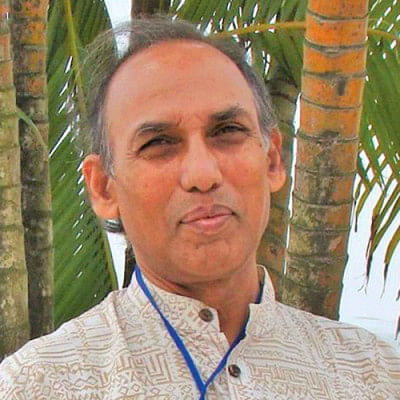
Throughout history, women have always been the driving force of civilisation. As much as it is essential to establish equity and equality in land and property rights, it is also important to understand that the prejudice and discrimination towards women in our society is multi-dimensional. Women of every class face some sort of prejudice based solely on their gender.
In terms of women's involvement in agriculture, at different stages of the production process, starting from decision-making to monitoring and access to the market system, we have constantly observed women's deprivation. What's unfortunate is that there are only some small initiatives aimed at solving these issues, and the state or society has taken no broader initiatives. We need to shed more light on the areas of deprivation and discrimination, such as women's lack of recognition in land and agriculture and women's limited access to education. Almost 40 percent of the population is still illiterate, and a large portion of these people are women. The lack of education leads to the acceptance of discrimination among many of these women.
Women from marginalised communities face disproportionate levels of discrimination and lack of security. Moreover, their complaints are usually neglected by law enforcement, leading to a lack of justice. The state has to take the lead in working to eliminate these kinds of discrimination.
When we talk about farmers, we no longer mean only people who sow, harvest and process crops. In every stage of farming, women are contributing at increasing levels, not only quantitatively but also qualitatively. These aspects must be included in conversations involving farmers. We must promote the role of women in farming so that not only will discrimination be reduced but our Gross Domestic Product (GDP) will also increase and improve the state of our economy.
The SDGs mention that no one shall be left behind. Historically, the people who have been left behind the most are marginalised communities and rural people. A large portion of these people are women. These women work for our safety, yet we don't try to provide them with any security. The only way to make development sustainable is by recognising dignity and contribution of women and their empowerment first.
Shirin Akhter, MP and Member, Standing Committee on the Ministry of Primary and Mass Education, People's Republic of Bangladesh
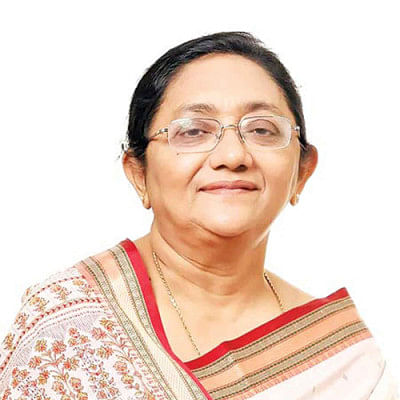
Although women carry out around 70 percent of the work in agriculture, they do not receive recognition as farmers or agricultural workers. Agricultural workers gaining recognition would mean that fair wages, benefits, food, healthcare, education, and accommodation are accounted for. Therefore, all agricultural workers should receive these same rights regardless of whether they are men or women. Giving legal recognition to women in agriculture is most important.
The participation of women in the distribution of khas land has to be encouraged by removing the barriers that prevent them from taking part. These barriers can be abolished by rethinking many of our existing laws.
When speaking about property rights, women's financial security, sustenance, and shelter will work as social capital. The One House One Farm project is excellent, and its loans are supposed to go to women mainly. However, in reality, the loans usually go to the men instead. Greater participation of women must be ensured.
Different categories of social security, such as maternal allowance, old age allowance, widow allowance, and husband-deserted allowance, empower women. A lot of corruption exists within this allowance system, but many of these issues will be solved once the system turns to mobile banking.
Women produce vast volumes of crops, but they do not have proper access to the market to sell these crops. Many municipalities have been instructed to have places designated for women in the markets. But, most of the time, men take over these spaces as well. Strict monitoring can ensure that these spaces indeed are reserved for and used by women.
Fazle Hossain Badsha,
MP and Convener, Parliamentary Caucus on Indigenous Affairs, People's Republic of Bangladesh
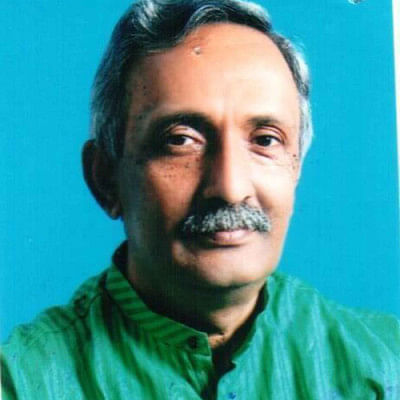
Women can never be equal if they do not receive equal rights over property and resources in society and family. Religion cannot be a barrier to women having equal rights over property within their families. If this conversation is not included in the broader discourse, women will not gain equal rights in society. Thus, women farmers will never gain access to khas land or gain recognition for their farming work. I am unsure when the right time to raise this issue is, but I believe women themselves can make this demand. People tend to worry about whether the land given to women can be considered effective ownership and hence bar women from having equal property rights. The state must create strong legislation protecting the property rights of women.
In villages where indigenous women have rights over land, they have to face unmatched levels of oppression and are often exiled. Maintaining their rights through just protests is extremely difficult. A lot more focus is required on this issue.
One crore people live on coastal lands. Whoever has power possesses these coastal lands. There is no legal rule in this regard. Do the women who live on these coastal lands have no rights? Do they not have rights over land? There are massive conflicts every year over these lands. Most of the time, people with political power possess the land. We need to talk more about the social, economic, and health security of the people, especially women, living on these coastal lands. Unfortunately, our national budget never includes development for the people living in the coastal areas.
Even today, women in our society feel unsafe and face various kinds of oppression and sexual violence, including rape. The courts are providing judgements but in a discriminatory manner. For example, a woman filing a rape case is asked by the court to marry her rapist to gain freedom. I cannot fathom why our legal framework would accept such settlements.
Nirupa Dewan, Former Member, National Human Rights Commission of Bangladesh
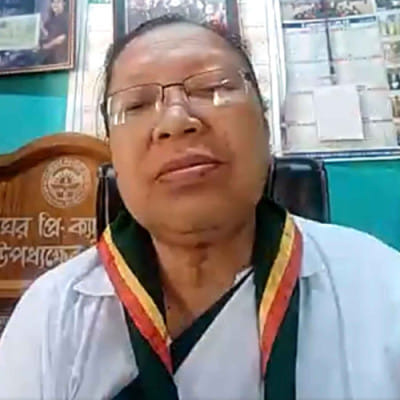
For generations, we, indigenous women, have worked just as hard, if not harder, than our male counterparts when it comes to earning a livelihood. However, due to the patriarchal society that we live in, we do not get any recognition for our work. Now, the issue is that we can only farm if we have land. But, in the name of development, roads, hotels, etc., are being constructed by evicting us and depriving us of our land and land rights. How can we think about farming when our land is being taken away?
I hope policymakers will keep the struggles of indigenous women in mind. Women farmers and women from any field of work belonging to indigenous communities face a variety of issues that must be resolved. Indigenous women are the most marginalised. We should try to stand by them in any way possible. If women are not legally recognised for their participation in agriculture and are not given their due land rights, we will always be discriminated against. Even though women's participation in farming and agriculture has increased, discrimination has not decreased. The discrimination is instead intensifying at different levels. We must work collectively to establish the basic rights of indigenous women.
Shamsuddoza Sajen,
Commercial Supplements Editor, The Daily Star & Moderator of the session

The contribution of women to Bangladesh's independence and its development is immense. But throughout history, this contribution has not been given enough recognition. This lack of recognition of women's contribution is still prevalent in our modern society.
Agriculture is one of the major drivers of economic growth in Bangladesh, where women's contribution is equal to or greater than that of men. Even here, women farmers are not given any institutional recognition. One of the main reasons for this lack of recognition is the landlessness of women. The legal system in the country over the last 50 years has also failed to ensure land rights for women. If we want to fulfil all of the SDGs, ensuring gender equality on all fronts is a must.
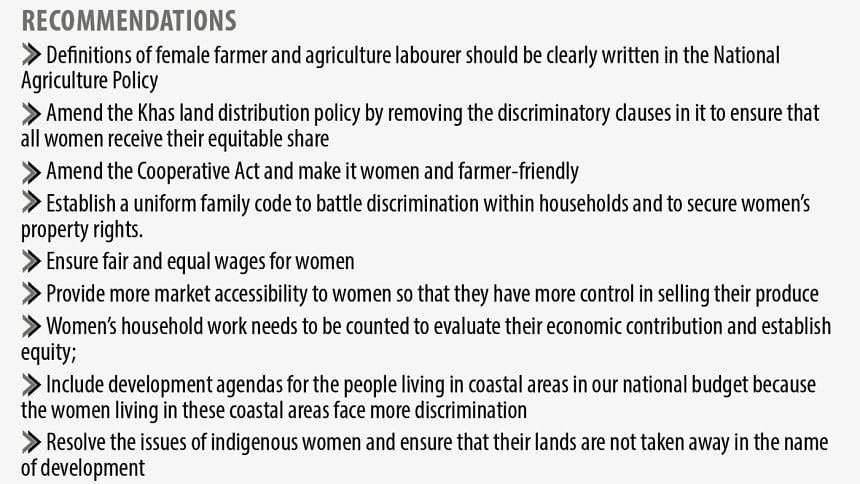

 For all latest news, follow The Daily Star's Google News channel.
For all latest news, follow The Daily Star's Google News channel. 



Comments